by M. C. Jennings | Jun 12, 2015 | Academics, College Decisions, Current Students, Uncategorized
Today’s blog is brought to us by Chase Hamilton.
Today, we finally got back on a normal schedule and spent the day here in Oxford. The morning started at 8:30 where a group of us got some much needed time to work on class projects and study for an upcoming quiz. Dr. Lytle took a smaller group of students to Oxford Analytica.
 Oxford Analytica is a global advisory firm that provides analyses of worldwide events for governments and businesses across the globe. In the next few weeks, each of us will have a chance to listen in as these businesspeople share their thoughts on what is happening across the planet. After our first hour and a half session, we took a thirty-minute coffee, tea, and crumpets break.
Oxford Analytica is a global advisory firm that provides analyses of worldwide events for governments and businesses across the globe. In the next few weeks, each of us will have a chance to listen in as these businesspeople share their thoughts on what is happening across the planet. After our first hour and a half session, we took a thirty-minute coffee, tea, and crumpets break.
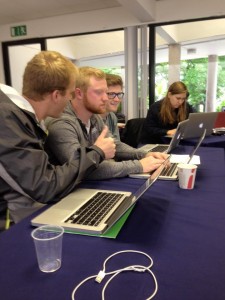
We then dove into a lecture about what marketing really is, and how the external environment drives how businesses should present their products to consumers. Assistant Professor Golden gave us a very helpful metaphor: businesses can pinpoint their “target market” just like a bow and arrow. The consumer is the bull’s eye while the bow represents the tools a company can use to reach their customers (the 4 P’s; price, product, place, and promotion). Lastly, the metaphor presented outside factors that can affect how firms reach their buyers which include ethics, environment, data, and consumer behavior.

After the lecture we watched an eye opening video on World War II in preparation for our visit to Normandy, France this weekend. The video concentrated on the death tally of the war and really showed the class just how much the war impacted so many different countries. The most shocking fact I learned in the video was how many Soviet soldiers and civilians were killed throughout the war, totaling around 15 million. I loved the video because it made me contemplate how many lives were lost during the war and how I am so thankful to the men and women that have given their lives to protect people in our country and countries around the world. After the video, we came back to the houses for a quick lunch before our last class session in the afternoon where we went over different marketing strategies and learned the SWOT model. Despite not doing anything monumentally exciting today, we definitely learned a lot from both a marketing and historical standpoint. We ended the night gearing up for the weekend trip to France.
by M. C. Jennings | Jun 10, 2015 | Academics, College Decisions, Current Students, Research, Uncategorized
COBA at Mini Cooper: June 8th by Ashton Darrow
Overall, Monday was great and full of Mini Coopers, marketing, and meeting people! We started out bright and early for the Mini Cooper factory tour just a few miles out of town.

After taking pictures of the vintage Mini Coopers we toured the manufacturing plant. We were able to see the start to finish line of the cars being manufactured.

We were all amazed at the quick precision of the robots in the factory that replaced human hands. After seeing the engines being built, we went to the portion of the factory where the car was painted and assembled in it’s entirety. Watching the custom-designed cars come off the line was fascinating.

After the tour of the manufacturing plant, we headed back to Oxford for a debriefing of all that we had learned. As a group, we discussed what we have learned about marketing from a real-life and global context.
Much of the afternoon was spent researching Asda and gathering market research on the streets. As a group, we learned how to approach people and discuss marketing in the real world.

COBA at Asda: June 9th by Bridget Fuessel
Today started with an early morning drive to the Asda store in Coventry.

This particular store was a concept model where they are trying out many different things to improve their customer’s experience.


The visit included an informational meeting, tour of the facility, and a short reflection and discussion time. In the short information meeting we learned the history of Asda and the external threats facing the brand and the UK grocery industry itself such as the high living costs consumers experience and the desire for efficiency in everyday life. After that, we got a tour of the store and learned what they are working on to bring more traffic inside and to make the consumers enjoy the time they spend doing their shopping.

To finish out our time at Asda, we had the opportunity to share our ideas, thoughts, feedback, and opinions with corporate managers who carved out time in their schedules to meet with us. And lastly, our day excursion ended with a group nap on the bus ride home. Today was much better than I expected and it was really cool to see how retailers do business and make decisions here in the UK!
by M. C. Jennings | Jun 8, 2015 | Academics, College Decisions, Current Students, Uncategorized
It’s been a busy few days for our COBA students and faculty. In keeping with our desire to have them narrate the blog, you’ll see posts throughout today highlighting several different authors. Read on to see what our students have been up to. Cheerio!
COBA in London: June 5th by Danae Basye
Yesterday was such an exciting first day in London for the COBA Study Abroad team! We began by visiting FitchRatings and ExxonMobil.

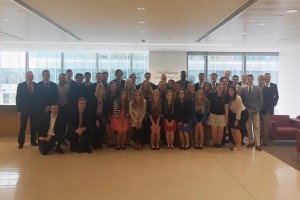
It was such a benefit to hear from the businessmen themselves about how they run their global businesses successfully. We were treated with hospitality from both businesses by being provided with refreshments and having the ability to ask questions and talk with them one on one. After our business visits, we had the incredible opportunity to see Les Miserables in the Queen’s Theater.

Yesterday is a day that will be hard to forget. We are growing more and more every day by seeing global business models first hand and this is only the beginning!
COBA in London: June 6th by Zachary Bealmear
Today was a great day for everyone traveling around London. There were three to four groups who stuck together and toured around. Most everyone stayed overnight in a hostel. For quite a few it was their first time. At least two of the groups took tours by bus. One of the great notes about today was a few of the groups got to see a parade at Buckingham Palace. It was the Royal Guard’s rehearsal for the Queen’s birthday next week. It was quite a show.

A few of the groups took a cruise down the River Thames. Narration was witty, the sights were beautiful, and the air was brisk on deck.


One thing that caught my eye was a small chalk drawing being made in Trafalgar square.

It was fairly simple group of world flags. I do not know whether the final picture was supposed to be flags of the world, EU countries, or former British colonies. Either way, it definitely was a great reflection of how London is a true cultural hub. Peoples of all nationalities come to London not just to tour, but to work, to trade, to live.

Overall, everyone got to see a piece of London. After everyone got back to the Oxford House, by train of course, we all shared a wonderful supper of delicious lasagna. It was prepared by Jackie, but of course she humbly said it was a group effort. I think after that meal, which of course was much needed after a long day of travel, they all deserve a big thanks. Unfortunately, as meals so good rarely last long, no picture is available.
COBA in Oxford: June 7th by Lakin Carpenter
Today was our first Sunday spent in Oxford and it has been an absolutely beautiful day. We got to sleep in this morning, which was so nice! The highlight of today was being able to go to Christ Church and experience their service, as well as look around the breathtaking grounds of the church.

As you can see in the picture, the church was gorgeous, both indoors and outside. My favorite thing about the service was the choir, and all the adorable little boys who had incredible voices! The church staff was so sweet and welcoming to our whole group.


After church a small group of us went to a cute little café for paninis and sweets! We also did a little shopping and bought some Oxford gear. Kaitlyn and Jamie tried a “macaroon frappe” from Paul’s which they highly recommend everyone try! (It was AMAZING)
Once we were done with church, lunch and shopping, a lot of people headed home to start on our hefty workload for the week. It was cool to reflect back on what we learned on our London visits, as well as to begin looking into Mini Cooper. I’m excited to tour the factory tomorrow!
We ended our day with 9 @ 9, and a lovely devotional.
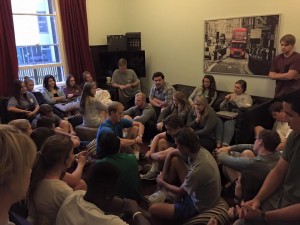
It was nice to decompress from our eventful weekend and spend time in community with each other. Being on this trip, I am constantly reminded of how truly blessed we are to have this opportunity. We get the chance to further our education, as well as travel across the world and learn about so many different cultures, which not many people (especially this young) get to do. Week one is coming to a close, and I’m ecstatic to see what the next three weeks hold for us!
by Neely Borger | May 23, 2014 | Academics, Accounting, College Decisions, Current Students, Placement stories
This last spring semester senior accounting major, Kyndal Coleman, had the opportunity to intern with Ernst & Young in her hometown of San Antonio. Kyndal worked in four different audit departments, including telecommunications, construction, energy, and consumer products. She also spent two weeks working in the Tulsa office of EY, gaining experience on a project with an energy company there. While interning, Kyndal learned how to work with a smaller team, challenging herself to learn quickly and perform well under pressure. She highly values the education she received at COBA, believing that COBA helped her to pay attention to details and apply the skills she was learning in the classroom. After interning with the company, Ernst & Young gave Kyndal a job offer. Kyndal plans to finish her Master’s Degree in Accounting and become CPA certified in the summer of 2015. Kyndal is one of many accounting students who represent COBA so well in the marketplace. Way to go Kyndal!
![250465_10150269741666264_2604693_n[1]](http://blogs.acu.edu/coba/files/2014/05/250465_10150269741666264_2604693_n1-253x300.jpg)
“The keys to success when interning: humility, patience, and a positive attitude when you are in a new environment,” says Kyndal Coleman, a senior accounting major from San Antonio.
by Neely Borger | Apr 30, 2014 | Academics, Careers In..., College Decisions, Current Students
On March 27th and 28th, five COBA students along with Dr. Terry Pope attended the RISE Investment Conference at the University of Dayton. The conference was a two day event and included students, faculty, and practitioners from all over the world interested in the various areas of investment. On the first day of the conference, participants attended panels that featured leading investment speakers from around the world, including President Sandra Pianalto from the Cleveland Federal Reserve Bank, anchor Kelly Evans from CNBC, and Chairman Chief Investment Officer Bill Miller from Legg Mason. On the second day of the conference, participants attended breakout sessions, learning about equity evaluation, wealth management, foreign exchange trading, and technical analysis. Dr. Pope was excited to expose students to influential people with powerful roles on Wall Street. The students were able to hear from the experts about their day-to-day lives working in the investment world. COBA highly supports and encourages students attending business conferences like RISE to learn from experienced professionals practicing in the marketplace.
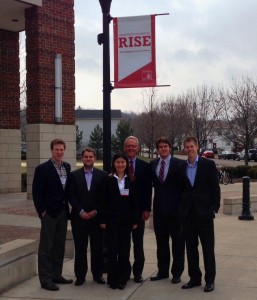
Dr. Terry Pope with COBA students Grant Wilson, Collin Graves, Bibb Frasier, Luke Luttrell, and Chloe Meung at the RISE Conference at the University of Dayton.
by Neely Borger | Apr 4, 2014 | Academics, COBA Events, COBA Faculty, College Decisions, Current Students, Faith Infusion
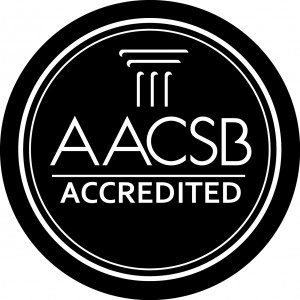
After the AACSB Business Accreditation Peer Review Team visited ACU’s campus in January, their Board of Directors and Continuous Improvement Review Committee have officially announced the extension of accreditation of the business degree programs offered at ACU’s College of Business Administration. Accreditation with AACSB is the hallmark of excellence in business education. Accredited business schools must meet specific standards of excellence, with their deans, faculty, and professional staff committing to ensure and deliver the highest quality of education to students. This accreditation represents the highest standard of achievement for business schools worldwide, with less than 5% of the world’s 13,000 business programs having earned AACSB Accreditation. Accredited schools produce graduates that are highly skilled and more desirable to employers than other non-accredited schools.
AACSB is a non-profit corporation of business schools, accounting programs, corporations, and other organizations devoted to the promotion and improvement of higher education in business administration and accounting. The organization was founded in 1916 and established its first standards for degree programs in business administration in 1919. To become accredited, a business school must go through a process of self-evaluation and peer review. There are a total of 694 member institutions, with representation in 45 countries. In Texas, there are a total of 36 accredited schools, eight of those being private universities. The private universities include ACU, Baylor, Rice, SMU, St. Mary’s, TCU, Trinity, and the University of Dallas.
The primary purpose of AACSB is to provide exceptional standards, carefully evaluating a business institution’s mission, operations, faculty qualifications and contributions, programs, and other critical areas of the school. An AACSB accredited school ensures students and parents that the business school is providing an exceptional education, as well as employers that these students are ready to enter the business field and perform well due to the high quality education. For the staff and faculty, an accredited institution attracts high-quality students and supports the promotion of research opportunities and global recognition.
COBA initially became accredited through the AACSB in 2004. Every five years, the Continuous Improvement Review Team from AACSB visits the campus to audit the quality and compliance of the business school, talking with students and faculty in regards to the quality of education and learning. 2014 marked the third visit for the team and the process of re-accrediting the college. Mirroring the previous two visits, the team was thoroughly impressed with the high standards and unique culture of COBA. Throughout the visit, members constantly commended COBA for its commitment to faith implementation and superior learning and engagement opportunities, including STAR, study abroad, Leadership Summit, and global leadership development. Faculty’s participation in training, research, development, and preparation also impressed the board.
The overall culture of excellence and hospitality truly made an impact on the team, clearly magnifying the quality and standards that distinguish ACU’s business school from the rest. The persistent drive for constant innovation, engagement, and impact with students, employees, and the community has made COBA excel in all areas, offering an environment that is determined to provide students and faculty with an experience full of value and excellence. COBA strives for innovation, continuously seeking opportunities to learn and expand student’s knowledge by using optimal sources. COBA’s faculty is committed to engaging with students and supplying them with the tools necessary to become successful in the workplace. For years, ACU’s College of Business has engraved these principles into each student and faculty member, integrating leadership and business skills with a firm foundation in Godly and faith-based principles. Becoming re-accredited with the AASCB is a clear confirmation of God’s work taking place in the College of Business Administration at ACU.

Click here to read ACU’s official press release on COBA’s re-accreditation. You can learn more about AACSB and the importance of choosing an accredited business school by clicking here.
 Oxford Analytica is a global advisory firm that provides analyses of worldwide events for governments and businesses across the globe. In the next few weeks, each of us will have a chance to listen in as these businesspeople share their thoughts on what is happening across the planet. After our first hour and a half session, we took a thirty-minute coffee, tea, and crumpets break.
Oxford Analytica is a global advisory firm that provides analyses of worldwide events for governments and businesses across the globe. In the next few weeks, each of us will have a chance to listen in as these businesspeople share their thoughts on what is happening across the planet. After our first hour and a half session, we took a thirty-minute coffee, tea, and crumpets break. 





















![250465_10150269741666264_2604693_n[1]](http://blogs.acu.edu/coba/files/2014/05/250465_10150269741666264_2604693_n1-253x300.jpg)


